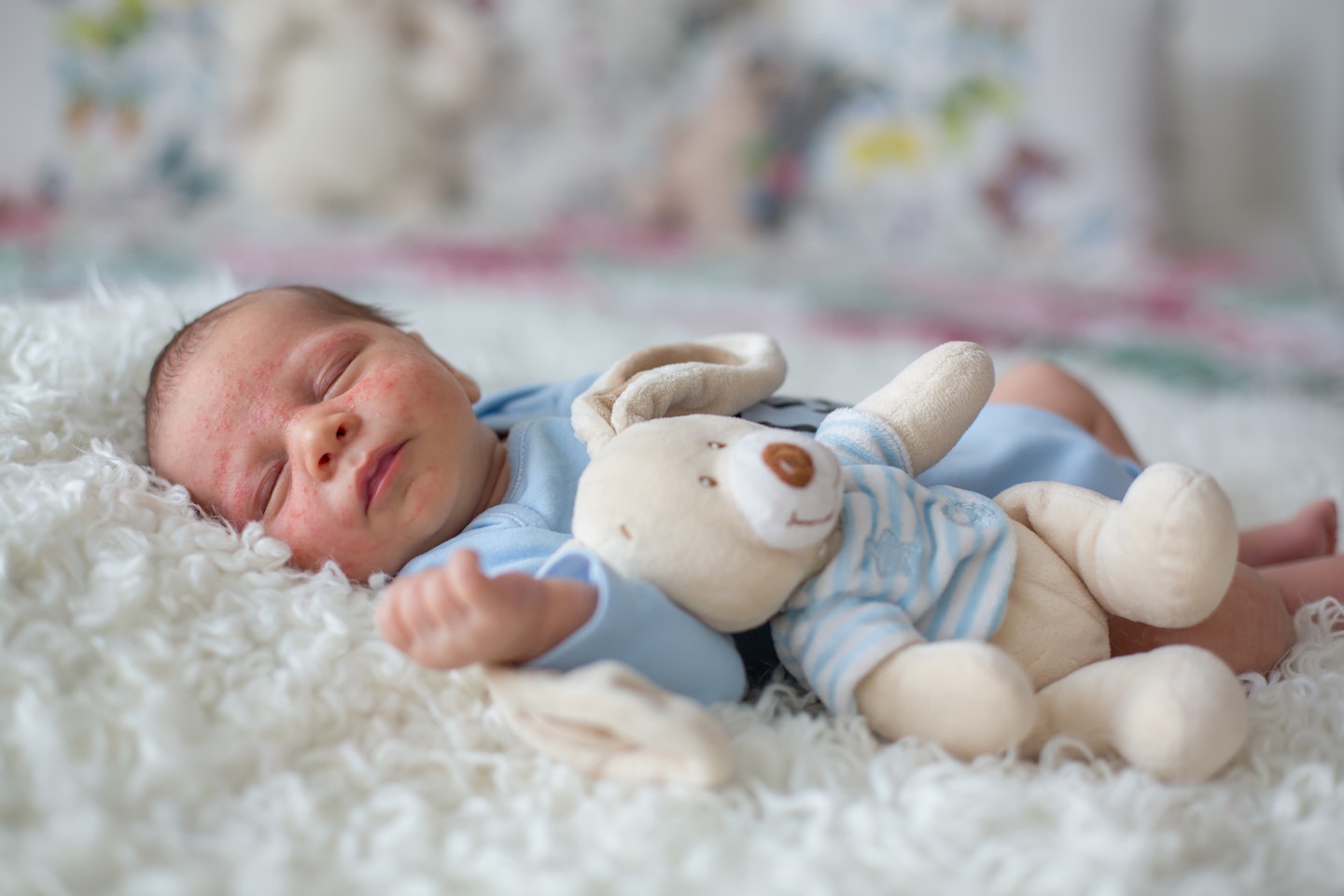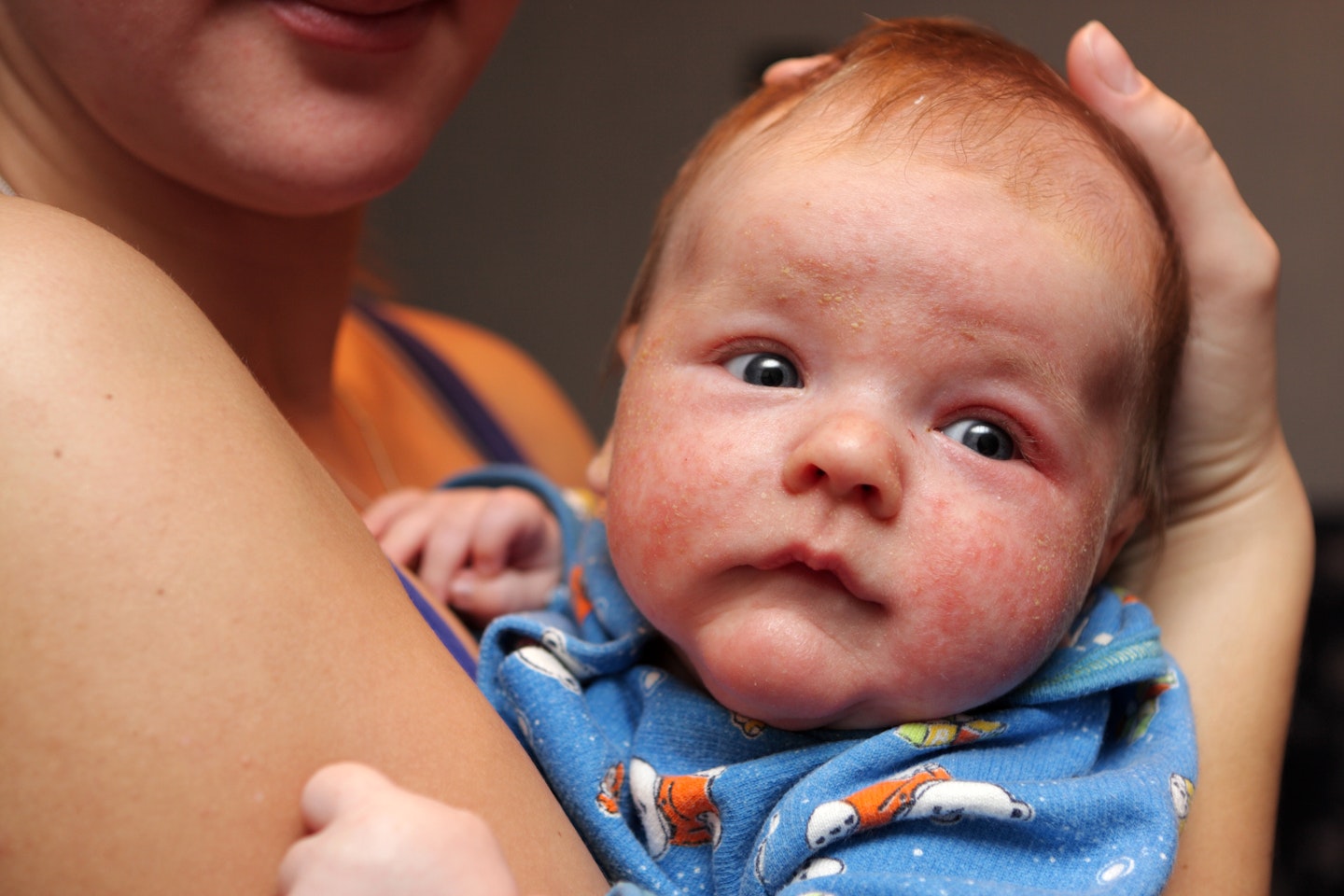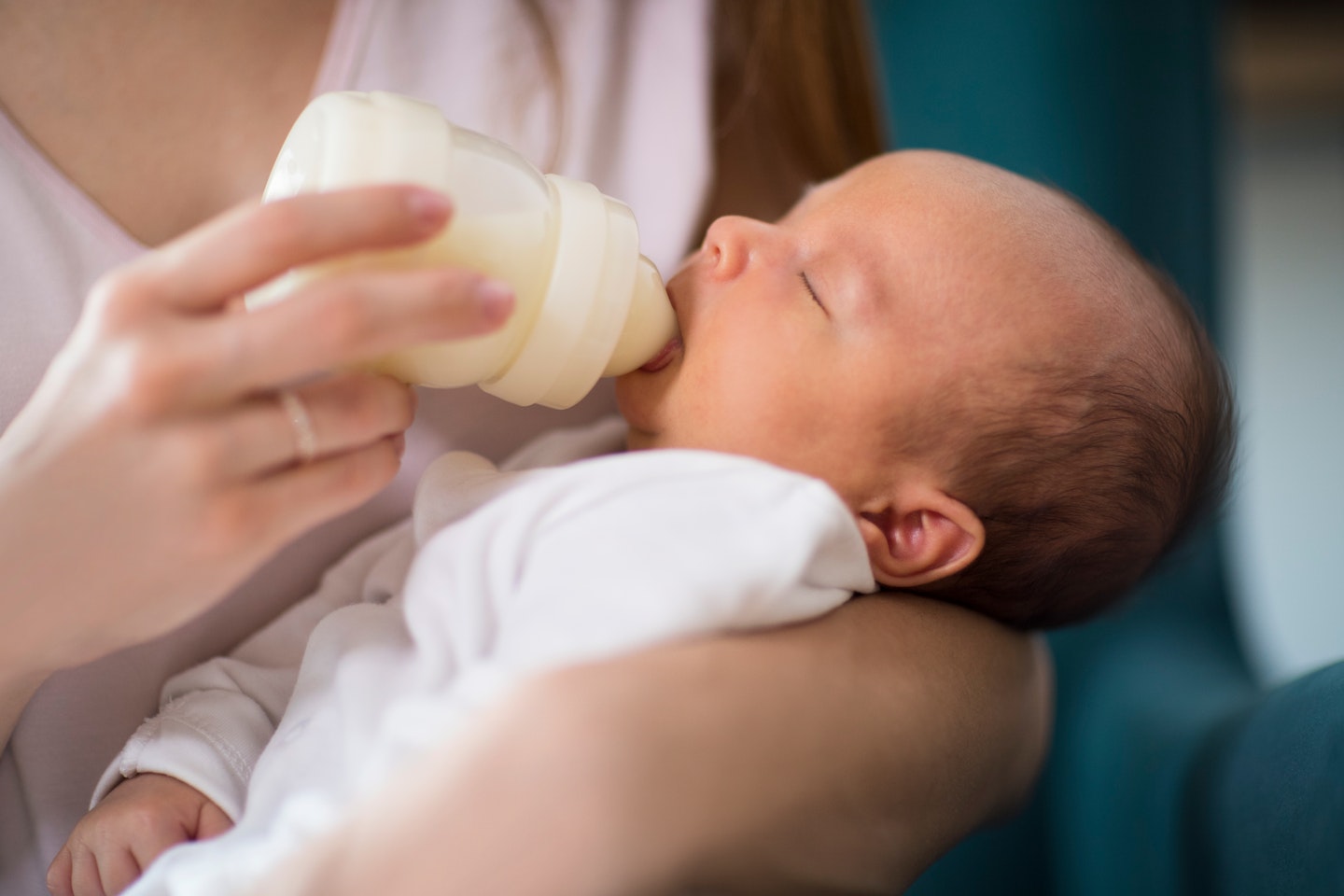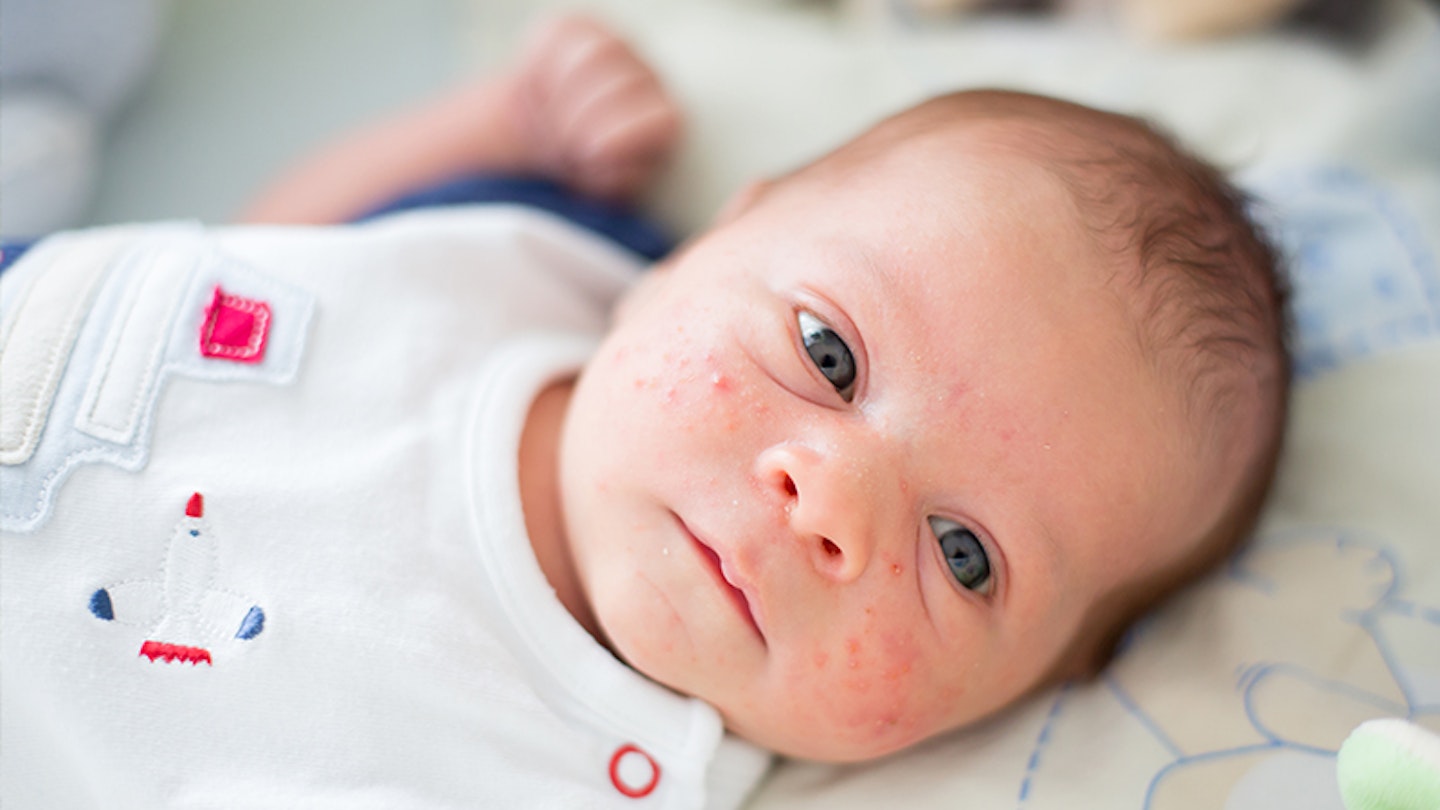Have you noticed your newborn baby has red or white bumps and pimples? It might be a case of baby acne, otherwise known as neonatal acne. This baby skin condition is common and should go away without treatment but we've spoken to skincare specialist, Patricia Boland, Lead Product Developer and Skincare Specialist from Colorscience UK to find out all you need to know about baby acne.
Read on to discover what causes baby acne, the symptoms and the baby acne treatments that you can try at home.

What is baby acne?
While it's only natural to worry when you see little spots on your newborn's previously perfect skin, baby acne is actually one of the most common infant skin conditions. Baby acne, or neonatal acne, consists of red and yellow small bumps that typically appear after the first month or so after birth. It is a harmless condition and in almost all cases, the acne completely clears by the time your newborn reaches 6 months. If these spots appear after your baby is 2 months old, it's referred to as infantile acne. If you notice this in your baby and they're older than 2 months, contact your GP as it can take longer to clear up.
What are the symptoms of baby acne?
Your baby might have pus-filled spots, and the sizes of these spots can vary. In some cases, these spots can disappear within a couple of hours and then reappear later either in the same place or somewhere else on the newborn's body.
Although redness, tiny spots, and pustules can be the main symptoms of baby acne, in some babies this acne appears more like a rough red rash. If you are unsure whether your child has baby acne, you should check with your local paediatrician.
Where does baby acne occur?
With baby acne, your newborn is likely to break out on their back, neck, forehead, cheeks, nose, and scalp. If your child gets hot easily or cries a lot, the acne can look even more prominent but there is nothing to worry about as this is quite common.
Baby acne is most commonly found on the face and head and can appear on:
• Forehead
• Nose
• Cheeks
• Chin
• Neck
• Head
What causes baby acne?
There are a number of theories as to why newborns develop acne, but there is no definite answer. Causes of neonatal acne include; the remnants of the mother's hormones combining with the baby’s in the womb, the medications the mother may have taken during breastfeeding, harsh chemicals such as laundry detergents reacting with the baby’s delicate skin or overactive glands in either the baby or the mother.
Does baby acne mean milk allergy?
While Milia, a different baby skin condition, is also referred to as 'Milk Spots', there's no proof that breast milk or formula give babies acne. It's possible that hormones may transfer from a mother through breastmilk to cause baby acne, but baby acne doesn't indicate a milk allergy so there's no need to change your feeding routine or type. In fact, while breastmilk doesn't cause baby acne, it does have anti-inflammatory benefits which may be helpful in clearing it up.
What are the differences between baby acne, a rash and eczema?

If you're wondering about baby acne vs rash and milk spots vs baby acne and aren't sure what your baby has, you're not alone. Distinguishing baby acne from other skin conditions can be difficult, but the key is to study the skin. When in doubt, always consult your local paediatrician who will advise you on the best way to care for your baby’s skin condition.
Eczema: Like baby eczema, baby acne can cause dry skin and redness, but eczema does not commonly cause bumps. Eczema can also be inflamed and itchy.
Rashes: With rashes, study where the rash has appeared. If it is a rash where sweat tends to occur such as the armpits, the neck, feet or even the back of the knee, these could be 'heat rashes'. If it's a rash that doesn't disappear when a glass is pressed against it, contact your doctor or NHS 111 as this can be a symptom of meningitis.
Milia: Another similar skin condition, Milia is often mistaken for baby acne but these are primarily tiny white bumps rather than red, yellowy white bumps.
Erythema toxicum neonatorum: Another skin condition that can be mistaken for baby acne, Erythema toxicum neonatorum can also appear in the first week and create red, blotches but these can appear on the body, chest, arms and thighs, as well as the face. Again, this is likely to clear up without treatment.
Baby acne - treatment
If you're wondering how to get rid of baby acne, the best advice is to be patient. Washing your baby's face with water and using a mild moisturiser may help, but the experts at Colorscience UK say the best treatment for baby acne is no treatment! They advise against using lotions, medicines or scrubs as your baby’s skin is delicate and aggravating it will only make the acne worse.
The best solution is to simply wash your baby’s face with plain water once or twice a day and gently pat it dry. Don’t use any soaps or rough towels when doing this. The acne should clear up completely after around a month but if it persists, consult your GP.

How to treat baby acne at home
There are a number of ways you can help your baby with baby acne at home, though you should steer clear of home remedies for baby acne and stick to a more simple routine.
• Continue with your normal bottle feeding or breastfeeding routine
• Wash the skin with plain water once or twice a day either as part of their bath or as a 'top and tail' clean
• Try to make sure your baby is getting enough sleep
• Ensure that your baby's clothes are clean and comfortable, along with their sheets and baby sleeping bag or swaddle.
• Avoid lotions or oils and any treatments designed for adults or older children
Your baby’s acne should clear up naturally, so the best thing you can do is be patient.
The expert medical view on baby acne
The NHS notes that "many things can cause a rash in babies and children, and they're often nothing to worry about." However, if your baby has a rash that's accompanied by the following, the NHS advises going to A&E or calling 999 as these could be symptoms of meningitis.
- have a stiff neck
- are bothered by light
- seem confused
- are shaking uncontrollably
- have a fever you can't control
- hands and feet feel unusually cold
- a rash that doesn't fade when you press a glass against it
Should I be concerned about baby acne?
If you're not sure if your child’s skin condition is baby acne or a rash, contact your doctor. Baby acne should not affect your child’s feeding, sleeping or temperature so if you notice any changes, consult a doctor immediately.
Remember that almost every case of baby acne goes away in a few weeks but if the problem persists or seems unusual, you as a parent, will generally know when to be concerned and call a doctor. After all, you know your baby the best.
About the expert
Patricia Boland is a Skincare Specialist from Colorscience UK with almost twenty years experience in the cosmetic and skincare industry.
Lorna White is the Products Editor for Mother&Baby. After running the Yours magazine website, specialising in content about caring for kids and grandchildren, Lorna brought her expertise to Mother&Baby in 2020. She has a keen interest in a range of topics from potty training and nutrition to baby names and early development and has a wide range of experienced medical experts and professionals at her fingertips. In her spare time, she enjoys spending time with her two young sisters, dog walking and enjoying the outdoors with her family.
